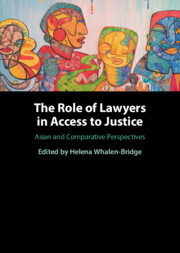Book contents
- The Role of Lawyers in Access to Justice
- The Role of Lawyers in Access to Justice
- Copyright page
- Dedication
- Epigraph
- Contents
- Figures
- Tables
- Appendices
- Contributors
- Foreword
- Acknowledgements
- Abbreviations
- 1 Understanding and Comparing Access to Justice
- Part I Access to Justice in Asia
- 2 Pro Bono, Legal Aid, and the Struggle for Justice in China
- 3 Access to Justice in India: Managing Multiple Mechanisms in a Restrictive Practice Environment
- 4 Access to Justice in Indonesia: Searching for Meaning
- 5 Access to Justice and Lawyer Independence in Japan
- 6 Improving Access to Justice in Malaysia: Introspection, Purpose, and Dynamism
- 7 Political Lawyers and the Legal Occupation in Myanmar
- 8 Alternative Lawyering versus Pro Bono in the Philippines: From Challenging an Authoritarian Government to Working with the State
- 9 Access to Justice in Singapore: A Government and Lawyer Dynamic
- 10 Public Interest Lawyering in South Korea: Standing on the Shoulders of Giants
- 11 A Hub, a Knot, and a Powerhouse: The Legal Aid Foundation and Access to Justice in Taiwan
- 12 Lawyers and Democratic Centralism in Vietnam
- Part II Comparative Perspectives on Access to Justice
- Index
7 - Political Lawyers and the Legal Occupation in Myanmar
from Part I - Access to Justice in Asia
Published online by Cambridge University Press: 29 September 2022
- The Role of Lawyers in Access to Justice
- The Role of Lawyers in Access to Justice
- Copyright page
- Dedication
- Epigraph
- Contents
- Figures
- Tables
- Appendices
- Contributors
- Foreword
- Acknowledgements
- Abbreviations
- 1 Understanding and Comparing Access to Justice
- Part I Access to Justice in Asia
- 2 Pro Bono, Legal Aid, and the Struggle for Justice in China
- 3 Access to Justice in India: Managing Multiple Mechanisms in a Restrictive Practice Environment
- 4 Access to Justice in Indonesia: Searching for Meaning
- 5 Access to Justice and Lawyer Independence in Japan
- 6 Improving Access to Justice in Malaysia: Introspection, Purpose, and Dynamism
- 7 Political Lawyers and the Legal Occupation in Myanmar
- 8 Alternative Lawyering versus Pro Bono in the Philippines: From Challenging an Authoritarian Government to Working with the State
- 9 Access to Justice in Singapore: A Government and Lawyer Dynamic
- 10 Public Interest Lawyering in South Korea: Standing on the Shoulders of Giants
- 11 A Hub, a Knot, and a Powerhouse: The Legal Aid Foundation and Access to Justice in Taiwan
- 12 Lawyers and Democratic Centralism in Vietnam
- Part II Comparative Perspectives on Access to Justice
- Index
Summary
Following a coup in 1962, the legal sector in Myanmar, then Burma, went into a protracted and steep decline. The practice of law fell from its earlier high status to that of a hobby or amateurish pursuit. The legal profession transformed into what this chapter characterizes as a legal occupation: legal education degenerated, the national bar association lost autonomy, and lawyers daring to challenge state power were met with strict sanctions. Myanmar’s opening up in the 2010s has brought international attention to its legal occupation as well as questions of access to justice and the rule of law. Drawing on in-depth cumulative research of almost a decade from 2008 to 2017, in this chapter we present findings which suggest that having weathered decades of military dictatorship under which even the assertion of minimal legal rights brought parties into conflict with the state, lawyers in the 2010s found both the wherewithal and the desire to refashion the legal sector in Myanmar. Following the work of Lucien Karpik and his co-authors, we class our subjects of inquiry as ‘political lawyers’, insofar as they mobilize for basic legal freedoms as well as civil and political rights by drawing on an array of material and social resources.
- Type
- Chapter
- Information
- The Role of Lawyers in Access to JusticeAsian and Comparative Perspectives, pp. 124 - 144Publisher: Cambridge University PressPrint publication year: 2022



